| Srl | Item |
| 1 |
ID:
152746


|
|
|
|
|
| Summary/Abstract |
How is the Association of Southeast Asian Nations performing as a manager of regional cooperative activities in East Asia? Despite increasing attention regarding its role in development of East Asian regionalism, few scholarly discussions about the effectiveness of ASEAN's managerial practices at the operational level have been attempted. This article aims to fill the scholarly gap based on the author's participatory observation of discussions among practitioners regarding management of cooperative activities for ASEAN mechanisms. It suggests that ASEAN's performance as a driver of East Asian cooperation has been insufficient and may possibly have weakened the mechanisms for greater cooperation.
|
|
|
|
|
|
|
|
|
|
|
|
|
|
|
|
| 2 |
ID:
152749
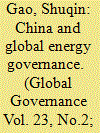

|
|
|
|
|
| Summary/Abstract |
China has been pursuing a risk averse counterweight energy strategy, cultivating strategic energy allies and diversifying its energy sources, generating a power shift of energy distribution from international oil companies to national oil companies. China's neomercantilism and NOCs suggest neither integration into the US-led international energy regime nor confrontation with the Organisation for Economic Co-operation and Development–centered global energy governance. Instead, China is working toward creating a China-led alternative competitive regime. The prospect is therefore the emergence of a more fragmented and multilayered global energy governance.
|
|
|
|
|
|
|
|
|
|
|
|
|
|
|
|
| 3 |
ID:
152743
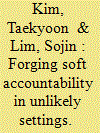

|
|
|
|
|
| Summary/Abstract |
This study sets out to introduce the concept of soft accountability as a new approach to understanding mutual accountability in unlikely settings of development cooperation through South-South cooperation. In doing so, this study analyzes three defining components of accountability (responsibility, answerability, and enforceability) and identifies the actors and modalities of mutual accountability in four different situations of South-South cooperation mechanisms. The main finding in this conceptual analysis contains establishing an institutional and sustainable development platform for the mutual accountability of South-South cooperation by not only reflecting the distinctive nature of South-South cooperation, but also focusing on responsibility first to reduce buck-passing among actors and to sustain its continuous management.
|
|
|
|
|
|
|
|
|
|
|
|
|
|
|
|
| 4 |
ID:
152744


|
|
|
|
|
| Summary/Abstract |
This article analyzes the sources of gridlock in the Group of 20 since the global financial crisis. It engages with this question through Mark Beeson and Stephen Bell's framework, which identifies two processes of socialization operating concurrently within the G-20: hegemonic incorporation and collectivist cooperation. While hegemonic incorporation seeks to socialize the rising Southern powers into the US-led world order, their inclusion over time drives the G-20 toward more collective and cooperative forms of global governance. The article argues that the GFC has altered this equation in two ways: by accelerating the shift of economic power from the North to the South, and by undermining the hegemony of neoliberalism in the South. These two developments have made the United States less willing to offer the concessions necessary for hegemonic incorporation while, at the same time, bolstering the confidence of the Southern powers. Consequently, the article proposes that both hegemonic incorporation and collectivist cooperation are undermined, leading instead to gridlock and fragmentation. The article illustrates this argument through a case study of the gridlock surrounding the issue of global imbalances.
|
|
|
|
|
|
|
|
|
|
|
|
|
|
|
|
| 5 |
ID:
152740
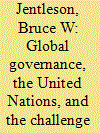

|
|
|
| 6 |
ID:
152741


|
|
|
| 7 |
ID:
152748


|
|
|
|
|
| Summary/Abstract |
This article builds on recent literature to argue that emerging economies are simultaneously norm takers and norm makers involved in a two-way socialization process with developed countries. It does this by tracing China's engagement in negotiations surrounding the norm of common but differentiated responsibilities within the UN Framework Convention on Climate Change between the 2007 Bali conference that set out to negotiate a post–Kyoto Protocol climate agreement and the 2015 Paris conference that succeeded in doing so. In making this argument, I push against the predominant unidirectional and dyadic models of normative change by illuminating the more complicated role emerging economies are playing in this process. The article further distills a typology of normative change from the literature to help us understand how and why emerging economies engage in this process.
|
|
|
|
|
|
|
|
|
|
|
|
|
|
|
|
| 8 |
ID:
152747


|
|
|
|
|
| Summary/Abstract |
This article considers the global governance of energy resources as a coordination problem to provide the intermediate global public good of payments and revenues disclosure. The demand for international arrangements to fill this gap resulted in the Extractive Industries Transparency Initiative and subsequent US and European Union disclosure standards for extractive industries. EITI has attributes of contested multilateralism such as being a multistakeholder voluntary coalition setting a standard for transparency. US and EU disclosure standards constitute unilateral pathways with a global vocation. The article argues that EITI and US and EU standards are simultaneously competing with and complementing each other, adding regime complexity but ultimately supplying higher disclosure standards in the energy sector.
|
|
|
|
|
|
|
|
|
|
|
|
|
|
|
|
| 9 |
ID:
152742
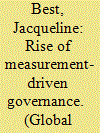

|
|
|
|
|
| Summary/Abstract |
Global governance is increasingly about measuring, ranking, and scoring. Focusing on the case of international development, this article suggests that we can learn a great deal about the recent changes in global dynamics by examining the rise of measurement-driven governance. The article engages with the recent scholarship on new governance, particularly the emerging literature on more experimentalist forms of governance. This study finds some evidence of a more experimentalist kind of governance in international development, but suggests that the specific technologies of measurement and accountability through which these new structures of decisionmaking are being facilitated are far from politically neutral. They are instead sources of considerable power that, in many instances, reinforce existing asymmetries and undermine the deliberative potential of these governance practices.
|
|
|
|
|
|
|
|
|
|
|
|
|
|
|
|
| 10 |
ID:
152745
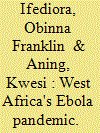

|
|
|
|
|
| Summary/Abstract |
The Ebola virus disease (EVD) outbreak in West Africa in 2014 became the region's most dangerous pandemic in history. Initially misdiagnosed by health authorities in Liberia, Guinea, and Sierra Leone, the epicenters of the crises, the wider health infrastructure of the international community similarly failed to grasp the enormity of the challenge posed by this pandemic to West Africa and its potential global ramifications. By the time recognition dawned about the immensity of the challenges that were posed by this pandemic, it took the introduction of extraordinary measures through the characterization of the disease as a threat to international peace and security pursuant to Chapter VII of the UN Charter to get the necessary institutional and bureaucratic machineries to intervene. This article argues that EVD, disastrous in its outcome, exposed the weaknesses and failures of existing institutional frameworks at national, regional, and continental to global levels. Focusing primarily on multilateral responses (the UN, the African Union [AU], and the Economic Community of West African States [ECOWAS]) to the epidemic, this article argues for enhanced global-regional collaboration in the context of the UN Charter's Chapter VIII for more effective future responses to health crises in West Africa. This article contributes to the ongoing debate on the reform of global health governance by analyzing the existing health governance strategies established by ECOWAS and implemented through the West African Health Organization.
|
|
|
|
|
|
|
|
|
|
|
|
|
|
|
|